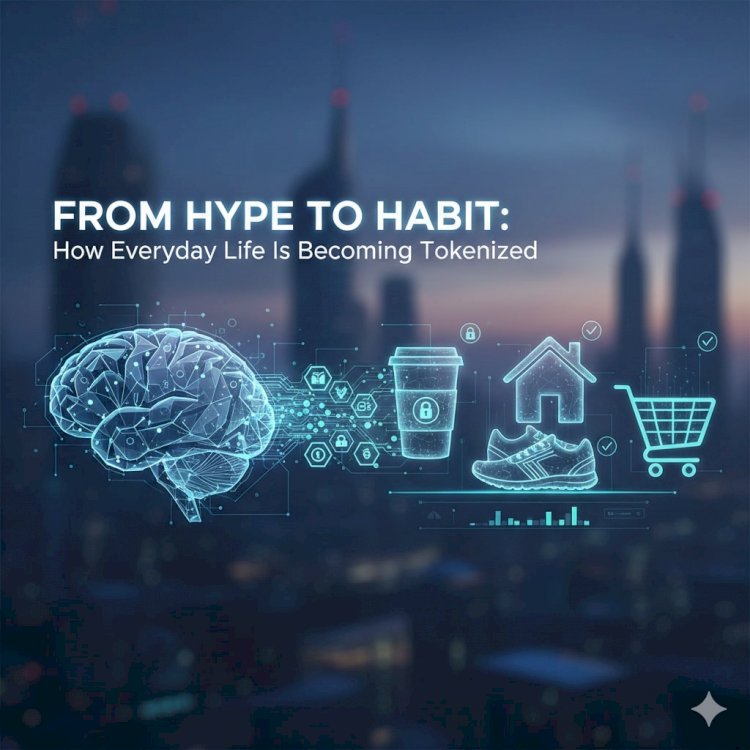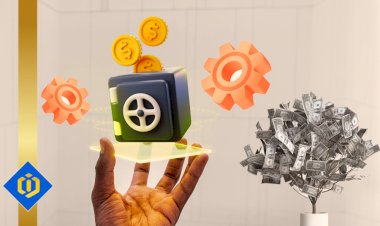From Hype to Habit: How Everyday Life Is Becoming Tokenized

By Dr. Pooyan Ghamari, Swiss Economist and Visionary
The Token You Didn’t Notice You Already Use
Five years ago “tokenization” sounded like sci-fi or scam. Today you wake up, check your phone, and interact with at least a dozen tokens before breakfast—without ever thinking “crypto.” The revolution didn’t arrive with fanfare. It arrived with convenience.
Your Morning Coffee Just Went on Chain
You tap your card at the café. Behind the scenes, the payment isn’t dollars or euros anymore. It’s USDC or EUROC settling in 1.3 seconds on Base or Polygon. The barista’s payroll is in tokenized treasuries. The loyalty points you just earned? An NFT that actually has resale value.
You didn’t sign a wallet. You didn’t see a seed phrase. Tokenization just became invisible infrastructure—like electricity.
The Gig You Landed Last Night Pays in Tokens Before You Wake Up
A client in Singapore posts a design job. You submit at 2 a.m. from Bogotá. By 8 a.m. your wallet pings: 850 USDC received, no invoice, no 30-day terms, no “we’ll pay you after the next funding round.”
Platforms like Braintrust, Gitcoin, and Rabbithole turned reputation into on-chain credentials and payments into atomic events. Freelancing is no longer “trust me, pay me.” It’s “proof of work = instant payout.”
Your Rent, Your Concert Ticket, Your Gym Membership—All Tokens Now
- Landlord accepts rent in USDC with auto-late-fees via a smart contract
- That Coachella ticket you bought? An NFT that gives you lifelong access to exclusive after-movie drops
- Gym sends your membership as a soul-bound token that proves you actually showed up 80 % of the time—so you get cheaper life insurance
These aren’t pilots. They’re live, profitable, and spreading faster than anyone in 2017 dared to predict.
The Quiet Death of “Ownership” as We Knew It
You no longer need to “own” things the old way:
- You stream a song → micro-royalty flows to the artist in real time
- You use a shared electric scooter → your ride fractionally owns the fleet token
- You stake stablecoins for 8 % yield → you’re now a mini money-market fund
Possession is being replaced by verifiable access, and access is being tokenized.
Even Governments Are Hooked (They Just Call It Something Else)
- Singapore’s Project Guardian: tokenized bonds traded 24/7
- Brazil’s Drex trials: tokenized retail deposits
- Switzerland issuing digital francs to banks on Ethereum
- BlackRock, Fidelity, and Franklin Templeton launching tokenized money-market funds worth hundreds of billions
The same regulators who once said “blockchain not ready” are now racing to issue the tokens themselves.
Your Identity Is Next—and It Will Feel Like Freedom
Soon your passport, driver’s license, diplomas, medical records, and proof of address will live in a wallet you fully control.
Board a flight → scan a QR, zero personal data shared, just a cryptographic proof you’re allowed to fly. Rent an apartment → prove income and credit history without handing over bank statements. Vote, file taxes, open a bank account—all with one private key and zero middlemen.
The era of begging institutions for permission is ending.
The Moment It Stopped Being “Crypto”
When your grandmother in Manila receives her pension in tokenized dollars… When your teenager saves for college by staking stablecoins at 9 %… When your local grocery store offers 2 % back in tokens that are actually worth something…
That’s the moment tokenization graduated from hype to habit. We didn’t adopt blockchain. Blockchain adopted us—one seamless, boring, life-improving transaction at a time.
The Future Is Already in Your Pocket
Look at your phone right now. Count the apps that already touch tokens without announcing it: Revolut, PayPal, Venmo, Coinbase, Binance, Robinhood, Stripe, Shopify, even some banking apps.
The age of speculation is over. The age of utility has quietly begun.
Tokenization isn’t coming. It’s already the default setting of tomorrow—and most people will never even notice the difference.
Dr. Pooyan Ghamari Swiss Economist and Visionary

 content-team
content-team 


















